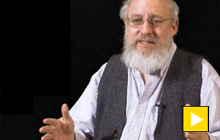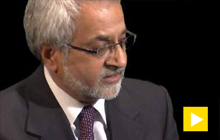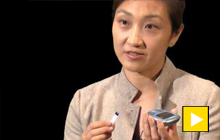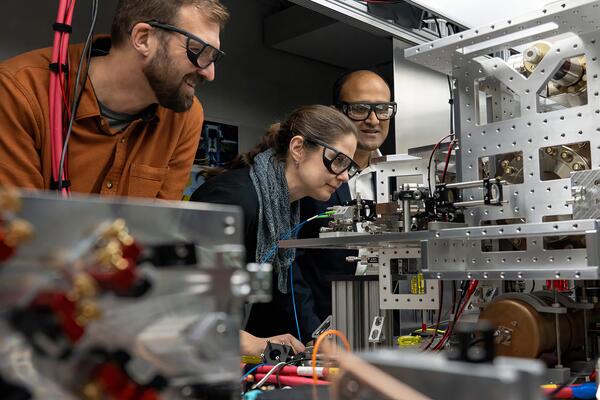This is a place of world-changing impact, where ideas have the power to transform, and unique intellectual property policies allow students and researchers to stake their claim to the future. Defined by an unassailable spirit of connection and collaboration, Waterloo is a place like no other.
Breakthrough scientific research happening at Waterloo will lead to better medical diagnosis and treatment, a revolution in communication and information security, power produced at a cost the Earth can afford and deeper understanding of the universe around us.
Waterloo research is changing the world.
Shining a light on black holes

As a member of the Event Horizon Telescope team, Avery Broderick is helping to unravel the mysterious nature and behaviour of black holes, from the properties of the "event horizon" to how some can launch the energetic jets of matter and radiation that shape their host galaxies.
An early test for Alzheimer's disease

Melanie Campbell sees the eyes as a window to the brain, where the presence of amyloid beta proteins in the neural layers of the retina may lead to an early and definitive test for Alzheimer’s disease.
How to build a brain

Chris Eliasmith’s team at the Centre for Theoretical Neuroscience has built Spaun, the world’s largest simulation of a functioning brain. Spaun is able to shift between diverse tasks — from copying human handwriting to finding hidden patterns in a list of numbers. Understanding the intricate connections between 2.5 million simulated neurons will lead to better understanding of how changes in the brain affect changes to behaviour.
Feeding Earth's growing population

Microbes that help plants grow in harsh conditions will help feed Earth’s growing population. It’s an affordable solution for both the developed and developing worlds, where farmers have already begun successful implementation of this technology.
The quest for the quantum "holy grail"

Harnessing the power of the quantum realm is paving the way for a new breed of computers with tremendous processing power. Today's computers encode, store and manipulate information using bits - zero or one. Quantum bits, or qubits, have the remarkable property of being in a "superposition" of zero and one. In other words, they can be in both simultaneously. This characteristic, and other quantum phenomena, offer a much richer environment for processing information and allows us to develop devices that will drastically outperform today's computing and communication technology.
On the frontiers of global information security
 The impact of quantum information processing on the world of cryptography will be broad and deep. Developing the next generation of cryptographic structures, structures that will be secure in a world with quantum technologies, is absolutely essential to robust global information security in the future.
The impact of quantum information processing on the world of cryptography will be broad and deep. Developing the next generation of cryptographic structures, structures that will be secure in a world with quantum technologies, is absolutely essential to robust global information security in the future.
Roadmap to low-carbon future

By 2030, we should be living in a low-carbon energy world. This is the goal outlined in the Equinox Blueprint, which provides feasible and flexible options from top researchers in sustainable energy, who met in Waterloo for the Equinox Energy 2030 summit. Their Blueprint recommends better energy storage technologies, enhanced geothermal, advanced nuclear reactors, off-grid electrification and a focus on smart urbanization.
Improving lives at nano-scale

Invisible to the naked eye, nanotechnology is being combined with biotechnology to achieve medical advances such as the early detection of life-threatening diseases through a simple device, similar to a glucometer, for example. Shirley Tang and her team believe that the primary goal of their research should be to help improve lives through these scientific breakthroughs.
















